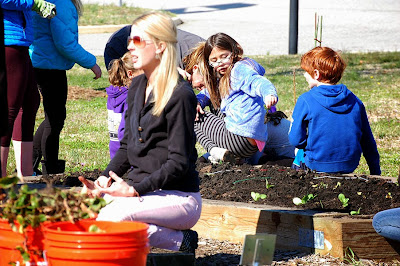In a world where we are used to instant gratification, it can be nice to know that some things are worth waiting for. Even if we have to wait three years for that first bite.
We planted asparagus in our spring garden this year. Asparagus is an interesting plant. Traditionally once it is planted it needs to grow through two full springs untouched. Then in that third spring the delicate spears can be harvested. While its growing season each spring is short, asparagus is a perennial, and will give back to us year after year.
Patience is one of many lessons students can experience first hand in a garden. Students also learn kindness, how to be gentle, how to nurture and to take in their world with all of their senses. Learning how to respect and care for plants goes beyond the garden beds. This devotion is translated to their community and the world at large and changes they way they interact with their environment.
While asparagus is our exciting new addition to the garden this year, students of the Green LIONS Garden Group planted many of our favorite spring plants: tender lettuces and spinach, spicy arugula, spunky radishes, vibrant purple carrots (the most nutritious variety for us by the way!), humble turnips, robust beats, crunchy sugar snap peas, elegant nasturtiums, dependable kale, and hearty cabbage and broccoli. We also spruced up the herb bed with new plantings of cilantro, dill, parsley and sage. Our borage flowers, avid self seeders, are coming back from last season, as are our strawberries. The blueberry bushes are trying hard to rally, and while our fruit orchard lost its native Paw Paw, the plum and peach trees have leaves and will soon have flowers.
Students enlisted the help of our worm bin by harvesting castings to add as natural fertilizer to boost the soil for planting. It takes a community of organisms, bacteria and a little human help to grow delicious vegetables in harmony with the earth.
This year we dedicated a portion of a garden bed to Thomas Jefferson by planting some of his heirloom seeds from Monticello. Jefferson was an influential seed saver and a lifelong student of nature. I wonder if he could have predicted that students today would enjoy planting seeds from the same plants in his vast garden. Tradition and sustainability, two more lessons taught by our garden.
“No occupation is so delightful to me
as the culture of the earth, and no
culture comparable to that of the garden.”—Thomas Jefferson











No comments:
Post a Comment